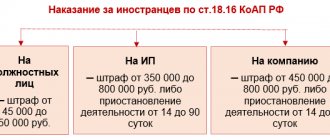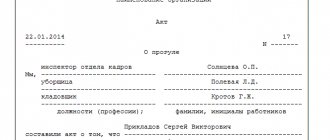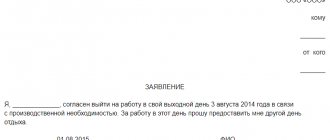27.08.2019
0
1448
5 minutes.
In a business environment, communication is very important, since the effectiveness and efficiency of all parts depends on its quality. The rules of interaction between superiors and subordinates, as well as within the team, are called subordination. It is based on respect for management, adherence to business etiquette and performing one's work tasks without conflicts.
How to properly write a report about an employee’s inappropriate and boorish behavior?
At any enterprise there will be an employee who does not respect his colleagues, subordinates and sometimes even his superiors. In contrast to disciplinary offenses and improper performance of one’s duties, it is sometimes difficult to punish an employee for inappropriate behavior, since rules on inappropriate behavior are practically not found in the Labor Code of the Russian Federation (with the exception of teaching staff).
What is meant by inappropriate behavior?
Since the concept of incorrect behavior, as well as punishment for it, is not prescribed in the main legislative acts, in order to be able to qualify the incorrect behavior of an employee, as well as apply punishment for it, it is necessary to include the above concepts in the local regulatory documents of the organization.
For example, in a collective agreement or in internal labor regulations.
The following actions can be classified as incorrect (boorish) behavior:
- offensive statements addressed to colleagues or clients of the organization;
- using profanity in relation to people or simply in colloquial speech;
- obsessive and rude behavior;
- obscene gestures towards colleagues and clients of the organization, etc.
These are just some of the main signs of inappropriate employee behavior.
This list can be continued almost endlessly, it all depends on the corporate policy of the organization and the scope of its activities.
What responsibilities should a technical director have in a company? For a sample technical director job description, see the link.
In addition to the above actions, this can include many others, including wearing revealing clothes if the company has a strict dress code.
Including a clause on inappropriate behavior in one of the organization’s local regulatory documents, as well as familiarizing the employee with them, is necessary so that the head of the organization has the right to punish the employee who committed this offense.
A sample act of failure to provide an explanation for the application of a penalty.
System of relationships according to subordination
If you follow the rules of subordination, interaction in all areas of activity occurs more efficiently. These are three main planes, namely:
- The leader is the performer.
- The executor is the leader.
- Relationships between partners.
In many organizations, the authority of the leader is very high. It follows from this that in a team it depends on the boss how well each employee understands the norms of behavior, taking into account subordination. This means that labor discipline is maintained within the proper framework, and employees do not confuse orders with requests or recommendations.
Who writes the report on inappropriate behavior?
Any employee who was present or the one to whom this behavior was directed has the right to draw up a report on the inappropriate behavior of an employee.
Calculating alimony from wages is not the easiest procedure. To correctly calculate child support, look at this material.
In addition to the memo, an act may also be drawn up in the presence of the commission stating that the employee behaved inappropriately towards employees or business partners of the organization.
Often, inappropriate behavior, in particular obscene statements addressed to someone, accompanies alcohol intoxication. So in this case, an employee can be punished twice for one seemingly wrongdoing.
For the appearance of an employee in a drunken state and for inappropriate behavior. But only on condition that the norms of inappropriate behavior and their prohibition are included in the local regulatory documents of the organization.
In this case, a memorandum or act is drawn up by a commission that records the fact that the employee is drunk.
Sample memo about boorish behavior of an employee
The procedure for drawing up documents stating that an employee has indulged in boorish behavior is no different from drawing up all other official memos and acts with which an official investigation begins.
Wage deductions must be documented. A sample writ of execution and instructions for drawing up can be found at the link.
The memo must indicate who behaved incorrectly, to whom such behavior was directed, and who was present.
It is also necessary to describe in as much detail as possible all the other circumstances of the incident. Very often the question arises as to whether to indicate specific statements in a report if they are considered non-normative.
A sample report can be downloaded from this link.
There is no clear opinion on this matter as far as the internal investigation is concerned. But if the case is brought to court, then it is necessary to indicate and, moreover, it is advisable to have witnesses.
The official investigation is carried out in accordance with the general procedure in compliance with the requirements of the law.
Since standards of conduct are often prescribed in internal labor regulations, violation of them can be classified as disciplinary offenses.
Sample memo about inappropriate behavior of an employee.
Employee Responsibility
An employee who indulges in inappropriate (boorish) behavior is usually subject to disciplinary punishment. Usually, depending on the severity, this is a reprimand or reprimand.
What are profitable investments in the material balance and in what cases are they taken into account? The answer to this question is in this material.
It is impossible to dismiss immediately for inappropriate behavior, since it does not apply to one-time serious ones.
But if the employee has already received a previously imposed disciplinary sanction for less than a year, then dismissal is quite possible, even if the previous sanction was imposed for a completely different offense.
In addition to punishment, according to the Labor Code, in this case, the norms of the Civil Code can also be applied, regarding insult to personality and dignity, and slander.
Both injured third-party citizens who have been insulted and directly employees of this organization can go to court.
There are precedents when a lawsuit was filed not against a specific employee, but against the organization as a whole, if the person who allowed himself to behave incorrectly (boorishly) held a high position.
How to document the receipt of goods? See the link for the rules for drawing up and a simple example of a goods acceptance certificate.
Also, the only way out for employees is to go to court in cases where the head of the organization allowed himself to behave rudely and incorrectly.
An example of a memo about an employee being late.
In any case, nowadays more and more companies have begun to pay attention to this part of employee communication as an important component of the business image of the enterprise.
Therefore, the norms for internal communication between employees, as well as with the organization’s clients, are increasingly prescribed in local documents, taking up more and more space there.
How to reflect business transactions in accounting? Detailed information is in this publication.
Although here, too, one should not get carried away and squeeze workers into a tight framework. Since there may be restrictions in current legislation. It is also appropriate to keep this in mind when creating a dress code for an organization.
You will learn how to write a report against an employee for insulting him from this video:
Head of the company
Being the head of even a small company is difficult, let alone a large holding company. The boss simultaneously builds relationships with subordinates, with department heads, with business partners, with clients, with investors, with banks, with the tax office, and so on.
This is extremely difficult to do, but it is important. Many managers put business etiquette on the backburner while promoting the company, thinking about increasing profits and increasing sales. This is fundamentally the wrong decision.
The director is the first person of the company. It is he who determines how communication will proceed in the company. This is the first thing you should think about when hiring new employees. After all, every subordinate must understand how he should communicate with the manager, how colleagues can interact with each other. When this understanding is not there, difficulties arise, the employee becomes embarrassed, does not show initiative, and may make a mistake in contacting the director.
In my practice, I have encountered examples of completely different leaders. The boss is a friend. Quite a common form of communication. When the director wants to create a friendly and relaxed atmosphere. This may be suitable for a very small company that is involved in creative activities. But for a large woodworking plant such a boss would be a disaster.
Being a tyrant is also far from easy. The principle “they are afraid means they respect” does not always work. Sometimes subordinates are afraid, but all they do behind their back is insult and mock him.
- The director needs to be attentive to his employees.
- Praise when required and punish when the situation is so.
- The boss should not be afraid or show his fear and uncertainty.
- The director should not solve all the personal problems of his employees. But at the same time, sometimes it is very useful to take the side of your employees.
Finding the perfect balance of communication with employees is difficult, but not impossible. It takes practice. If you hold the position of a manager, then the article “How to lead a team if you are a boss” will be extremely useful to you.
Sample memo about inappropriate behavior of an employee
At any enterprise there is an employee who is disrespectful to other subordinate employees, and sometimes even to management. Unlike offenses that violate discipline or improper fulfillment of assigned obligations, at times it is not easy to hold an employee accountable for incorrect behavior, since such norms are not found in the Labor Code of the Russian Federation (with the exception of persons involved in the field of education).
What is meant by inappropriate behavior?
Based on the fact that the concept of incorrect behavior, as well as the norms of influence and punishment for it are not provided for in the main legislative acts, in order to be able to characterize, evaluate behavior as incorrect, and also apply measures for this, it is necessary to indicate in advance that for a specific organization is tactless, unacceptable behavior and introduce the above concepts into regulatory and internal documents.
For example, write down this concept and responsibility for it in an employment contract with an employee or in a list of explanations on internal rules of labor regulations and behavior in a team.
Taking into account the mentality and education of society, the basis for such behavior can be taken:
- offensive statements regarding colleagues, partners and clients of the company;
- the use of profanity addressed to someone else or simply in colloquial speech;
- annoying and rude behavior;
- inappropriate gestures towards colleagues, partners and clients of the organization;
- failure to comply or obvious disregard for instructions and instructions from senior management;
- illegal reduction or increase in working hours by a structural manager, without agreement with superiors and alteration of the staff work schedule;
- cancellation of the lunch break or a ban on leaving the workplace if necessary, etc.
The first step in dealing with such an employee may be to write a memo, because... Without the written preparation of this document, it is almost impossible to prove inappropriate behavior and identify the basis for it, as well as understand the situation with subsequent conclusions.
How to protect yourself
Protecting a subordinate from insubordination is a rather difficult process. Moreover, many do not know where to start from. So, first of all:
- Try to talk to your superiors. No one can kick you out for a correct conversation, even if it carries criticism. But it’s better not to do this with the whole team.
- If the first point does not work, then you need to contact the trade union, a labor dispute commission consisting of employees and management.
- If these measures are not suitable, or they cannot be implemented due to circumstances, then you can contact the State Tax Inspectorate, the court, and if there are unlawful actions of the party, the prosecutor’s office. But in the last two instances, clear written evidence, as well as audio or video, is required.
If your actions are legal, you can prove that you are right, but the problem is that even if the rules of subordination are observed, both the boss and the team can then use completely legal means to force the employee out of the organization. Therefore, this factor should be taken into account before the start of disputes, and also carefully study internal documents and the employment contract for discrepancies with the real state of affairs.
A Moscow investigator may pay with his career for insubordination, as the video below will tell you:
Recommendations for design
The report on violation of labor discipline was assigned code 0286041 according to OKUD.
The document can only be of an informational nature; it provides information about the process of performing various works or the completion of events.
The reporting report notifies about the process or completion of the assigned tasks, assignments, instructions, and special work. By this, it ensures communication between the subjects of governance at the vertical level - from bottom to top - and is directed from a lower-level official to a higher-level one.
Depending on the address, notes can be:
- Internal - sent to the head of a structural unit or organization (in any form, no form required);
- External - addressed to higher authorities or governing structured bodies (mandatory on the organization’s letterhead).
The list of labor documentation, its forms, structure and samples, as well as requirements for preparation are given in the Labor Code of the Russian Federation. With the exception of an information and reference document, one of the types of which is a memorandum.
The document must be clear and structured and must not contain:
- manifestations of feelings or emotions;
- unnecessary information that does not relate to the essence;
- errors or lack of mandatory information that may cause the document to be invalidated.
Documents for download (free)
- Sample report on boorish behavior
You should not submit a report to management if:
- there is a personal hostility;
- there is no evidence of the incident;
- the kurtosis is not of a large degree and did not affect the efficiency of labor at all;
- the conflict situation was corrected in time.
Consequences of non-compliance
Fortunately, in most cases, insubordination in business relations is not a criminal liability, and often it is an ordinary violation of certain ethical standards.
Subordination is a way of designating responsibility for each employee, both for superiors and subordinates.
Obviously, it is different for each worker, and, for example, an ordinary employee risks being left without a job, and the boss, on top of everything, also risks his reputation, as well as money. Therefore, the higher the responsibility, the more demanding a person is in relation to his subordinates. The company will not be successful without maintaining horizontal and vertical subordination.
Remember that even if an employee is irreplaceable, and at the same time takes liberties in relation to colleagues and superiors, you still need to apply certain punitive measures to him, up to and including dismissal. The boss is the leader in the team, and he must monitor compliance with subordination.
The consequences of failure to maintain proper labor relations depend on how far the subordinate has departed from the chain of command in relation to his superiors. A one-time violation of norms will be punished through a verbal reprimand and deprivation of a bonus, but a disciplinary offense or regular neglect of subordination may result in a severe reprimand. A reprimand is not entered in the work book, but may well be considered grounds for dismissal.
Dismissal under this article can greatly affect your future career, since other employers will not want to hire employees who are prone to violations of labor discipline. If the management itself does not comply with subordination, then subordinates must complain to higher authorities, then the same penalties will be taken against him.
Differences from service and explanatory
In addition, it is worth distinguishing between the purposes of different types of internal organizational document flow and submitting a report when you can get by with a simple “service”.
It is often confused with service and explanatory, however, despite the similarity, replacing one with the other is unacceptable due to their purpose and distinctive specificity.
Distinctive features of a memo from a memo: type of statement - an official memo is strictly an internal document, while a memo is a document both internal and external, and can be sent to authorities outside the organization.
An internal memo provides a relationship at the horizontal-direct level “boss – employee of the same level”, and a memo – at the vertical-service hierarchy “employee-boss”.
A memorandum differs from an explanatory note in the semantic presentation and structure of the document. The explanatory statement consists of two parts, one of which reflects the fact that initiated its preparation, and the second explains why specific circumstances occurred.
Any employee who was present during the unusual situation or the one to whom this behavior was directed has the right to draw up and submit a report.
The report, in contrast to the explanatory and official report, is sent exclusively to higher management, authorized persons, and superiors. Information from the content is precisely intended to cause some kind of active action, which one depends on the goal, information and wishes.
The punishment may be:
- a written reprimand followed by a fine or dismissal;
- reprimand followed by a fine or dismissal;
- dismissal due to insufficiently conscientious attitude towards work or repeated warnings and reprimands.
Important: upon the first violation, dismissing an employee due to an insufficiently conscientious attitude towards work or towards the team without conducting conversations with him, warnings and issuing punishments is unlawful and illegal!
No other types of punishment are allowed. But each individual organization has the right to apply its own measures, which it deems necessary, within the limits of admissibility and norms.
Such measures must be specified in the employment contract with the employee or in a list and explanation of the internal rules of labor regulations and behavior in the team. The employee must be familiar with these requirements in advance.
The memo regarding inappropriate behavior refers to internal correspondence. This is not a verdict or a guarantee of the application of sanctions and punishments, but only a notification of an unusual situation in the team and the identification of violations.
The management reads, considers the appeal and makes a conclusion, makes its assessment of how justified it is to apply sanctions. The employee will definitely be given the opportunity to justify himself and explain the current situation. They write an explanatory note with their vision of the incident and an explanation of specific behavior.
If the employer finds the justification unsatisfactory, he will issue and sign an order for disciplinary action. According to the law, this can be a reprimand, reprimand and dismissal. If it is written unreasonably and is slander, and the employer discovers this, then the author will have to answer and face disciplinary punishment.
Subordination is a necessary element of corporate ethics. This is a set of rules of conduct, an important element of which is all the subtleties of the relationship between a boss and a subordinate. These are not just rules of good form and manners. Subordination ensures respectful treatment and productive work. For example, many managers face the following problem: they treat their subordinates very softly, as a result of which the latter begin to miss deadlines and perform their work poorly. It is difficult for a manager who does not respect the chain of command to point out the shortcomings of the work of his subordinate, who has become almost his friend. Rules help you save nerves and avoid conflicts.
Features of service relationships
There is no clear list of distinctive features of a working relationship, but we will try to highlight a few:
- hierarchy - each organization has an established vertical of power, documented in the job description, collective agreement, labor agreement. Here you will find out what rules are used to draw up the job description of the general director of an LLC;
- ethics – the legislation does not establish a clear line of behavior for employees and management. Norms of behavior and business communication are formed under the influence of ethical and moral principles and education;
- sanctions - non-compliance or non-compliance with generally accepted standards of behavior entails financial penalties, verbal reprimands, demotions, and dismissal. How to correctly draw up a disciplinary sanction order - read the publication at the link;
- improvisation – in our country there are no high-quality educational institutions that would teach corporate etiquette and the rules of business communication.
Regulation of official etiquette
If company management neglects to develop rules, this is fraught with chaos and confusion in the work process. Each employee should know who will help him, whose requirements he must fulfill, how much work his subordinate is ready to handle.
Large organizational structures build structural diagrams where the hierarchy between divisions and departments is clearly visible.
As mentioned above, the rules and norms of behavior are determined by: orders, the charter of the enterprise, labor and collective agreements, job descriptions. The rules for drawing up and executing a job description for a chief accountant are discussed here.
There is no legislative regulation of relationships, but Article 192 of the Labor Code of the Russian Federation lists the main types of disciplinary sanctions.
Labor Code of the Russian Federation Article 192. Disciplinary sanctions
For committing a disciplinary offense, that is, failure or improper performance by an employee through his fault of the labor duties assigned to him, the employer has the right to apply the following disciplinary sanctions: 1) reprimand; 2) reprimand; 3) dismissal for appropriate reasons. Federal laws, charters and regulations on discipline (part five of Article 189 of this Code) may also provide for other disciplinary sanctions for certain categories of employees. Disciplinary sanctions, in particular, include the dismissal of an employee on the grounds provided for in paragraphs 5, 6, 9 or 10 of part one of Article 81, paragraph 1 of Article 336 or Article 348.11 of this Code, as well as paragraph 7, 7.1 or 8 of part one of Article 81 of this Code Code in cases where guilty actions giving grounds for loss of confidence, or, accordingly, an immoral offense were committed by an employee at the place of work and in connection with the performance of his job duties. The application of disciplinary sanctions not provided for by federal laws, charters and regulations on discipline is not permitted. When imposing a disciplinary sanction, the severity of the offense committed and the circumstances under which it was committed must be taken into account.
Inner order rules
Recommendations to help you save your job:
- Do not make sarcastic and rude remarks directed towards a superior. If you have a constructive suggestion, express it politely.
- Closedness and reticence are the main vices when communicating with superiors. Try to show more interest in the conversation, do not answer in monosyllables.
- Address your superiors carefully, as your immediate supervisor will take this as a sign of disrespect on your part.
- If the team is given a task, but responsibilities are not assigned, do it yourself. Such a solution will increase efficiency and eliminate discrimination in labor activities.
- Don't make empty promises that you can't keep. Soberly assess your chances of success.
- Don't use your colleagues as a tool for self-realization.
- Try to take the initiative when solving non-standard problems, do not hesitate to express your opinion. Be a support for your superiors and other employees of the company.
Key principles of subordination.
Consequences of non-compliance and violation of labor discipline
Isolated cases of insubordination lead to verbal reprimand from senior management. After the debriefing, the boss closely monitors the offender.
The extreme penalty is dismissal. Management meets the offender halfway and offers to write a letter of resignation of his own free will. However, extreme dissatisfaction leads to unilateral termination of the employment contract. The note is entered in the work book.
Normative base
The rules of subordination are established by the company’s internal documents, such as:
- Collective agreement. It establishes the basic principles of interaction.
- Inner order rules. They indicate the work schedule and rules of conduct in the workplace.
- Job description. It indicates the specific responsibilities of the employee, as well as his status in the company hierarchy.
- Contract of employment. It stipulates individual rules for a specific employee.
Each company has the right to independently develop rules of subordination that are relevant for a specific space. However, they are all based on basic ethical standards.
FOR YOUR INFORMATION! Within the framework of the law, the rules of subordination are regulated by Article 192 of the Labor Code of the Russian Federation. Here is the responsibility for failure to comply with established standards.
How to fire an employee for violating labor discipline
- It is necessary to draw up a written notice of dismissal, which must be sent to the employee in order to inform him.
- Next, a dismissal order is drawn up, the basis for which will be papers proving the existence of a violation.
- Preparations are being made for the day of dismissal: papers are collected, an entry is made in the work book, payments are calculated.
- The process ends on the day of dismissal, when the employee receives the documents and the money due to him. After this, the employment contract is considered officially terminated.
- crimes committed within the enterprise;
- causing property damage to the company;
- being intoxicated at work;
- one-time or systematic violation of the terms of the employment contract;
- disclosure of trade secrets;
- indecent behavior during work;
- absenteeism or absence for more than three consecutive hours during working hours.
24 Dec 2021 marketur 158
Share this post
- Related Posts
- How to return insurance for a loan from a post bank
- Find out the registration number in the FSS by tax identification number
- Agreement for consulting services
- Who returned the loan insurance from Sberbank
Basic rules of interaction between company representatives
The norms of subordination depend on the type of hierarchy:
- Vertical. Assumes that the higher level gives instructions to the lower one. For example, a manager gives tasks to his subordinate. The latter is obliged to fulfill them.
- Horizontal. Involves interaction between employees of equal status.
Relationships that involve submission are traditionally considered difficult. Hidden conflicts often arise between the manager and subordinates, which complicate work. Subordination helps prevent problems. Its features depend on what kind of relationships are regulated.
Between subordinate and leader
Within a vertical hierarchy, the main role belongs to the manager. He has a great responsibility for healthy communication. Let's consider the basic rules within such relationships:
- Lack of familiarity. If a manager makes a subordinate his friend, it will be very difficult to give tasks or criticize work. The harshness of the boss in such a situation can lead to hidden conflicts and hostility. An example of familiarity is talking about personal life over a cup of tea. Naturally, a boss can communicate with a subordinate. However, you should stick to topics that are not too personal.
- Correct attitude. The employee, in turn, should not speak about his superiors in a negative tone. This does not mean complete submission. If the leader is a tyrant, the problem should be resolved legally.
- Politeness. If a subordinate wishes to propose any idea to the manager, he should do so as politely as possible. You must enter the boss's office only after knocking first.
- Maintaining hierarchy. You only need to contact your manager, and not this manager’s boss. Such jumping over a step can offend the manager.
- No insults. Disputes may well arise between a manager and a subordinate. And it is very important to conduct them correctly. In this case, differences of opinion will only enrich the work. During conflicts, you cannot insult a person based on his religious or political beliefs. It is strictly forbidden to point out flaws in appearance.
The manager needs to remember that he is the one who sets the main tone in the relationship.
Between bosses
Relationships between management can be either horizontal or vertical. In the first case, the status of the bosses is general. In the second case, a hierarchy is assumed. For example, there is a company manager, and there is a project manager. The former is higher in the hierarchy than the latter. Let's consider the rules of subordination within a given situation:
- Save time. Most conversations should be strictly business. There is no need to allow endless idle talk. You can talk about personal matters and joke after your work shift.
- Lack of subjectivity. When arguing, you should base your argument not on your personal views, but on documented facts.
- Correct attitude. Top management is strictly prohibited from scolding a lower-level manager in front of the latter's subordinates. This is a serious insubordination. Essentially, this is how a person creates a situation in which the manager’s subordinates stop respecting him. This will negatively affect all work processes. If an employee should be pointed out about his mistakes, it should be done face to face.
The respectful attitude of managers towards each other allows us to create a favorable climate in the company. It must be remembered that fish rots from the head. If management has conflicts, then ordinary employees will inevitably have them too.
Between subordinates
Less stringent requirements are imposed on subordinates. Let's look at the basic rules:
- Squabbles and gossip should not be allowed.
- It’s good if the atmosphere in the company is family-like, but it is not recommended to get too close. An employee may become a manager, but friendly relations with the staff will prevent him from giving instructions.
- You should not intercept clients from your co-worker. There will be a lot of clients, and you will have to “enjoy” a damaged relationship with a colleague every day.
- One should not make promises that a person is not sure of. A colleague may hope, which will lead to unfavorable consequences.
Subordination between subordinates is determined purely by the specifics of the company. For example, young creative companies have a friendly environment.
Maintain subordination: common mistakes
To maintain a fruitful working atmosphere, you should not make common mistakes that lead to failure to comply with subordination:
- When giving an order to a subordinate, the boss must himself monitor execution. You cannot delegate control to another subordinate.
- The subordinate must report for the completed task to the superior from whom it was received.
- The manager should not give instructions to employees without the knowledge of their immediate superior. This will lead to discrediting the latter in front of his subordinates.
- You cannot punish a subordinate bypassing his immediate supervisor.
- You should not reprimand or punish an employee in front of his colleagues.
- If a subordinate makes mistakes, you should talk to him in a correct manner, without showing aggression.
- The priority of tasks should be clearly communicated to subordinates. They must understand which work is more urgent and which can be postponed and for how long.
- It is rude to criticize colleagues behind their backs, especially in the presence of subordinates. Likewise, subordinates should not publicly discuss the leader, undermining his authority.
- Compliance with business etiquette always benefits common goals. Blurring the lines between a boss and his subordinates and addressing them on a first-name basis leads to a decrease in his authority, slackness among employees, and irresponsibility.
You can learn more about how to correctly give orders to subordinates in this article.
Responsibility for failure to comply with the rules of subordination
Responsibility for non-compliance with the rules is stipulated in Article 192 of the Labor Code of the Russian Federation. In particular, these are the following measures:
- Comment. Provides a verbal indication of an employee's error. It is necessary to prevent incorrect actions in the future.
- Rebuke. Represents a written expression of your comment. A corresponding mark is placed on the employee’s personal card. A reprimand is a measure that is used after a reprimand is made. If an employee does not understand an oral comment, it is expressed in writing.
- Dismissal. This is the most severe disciplinary measure. Can only be used if the employee has been reprimanded several times. All of them must be properly formatted. You cannot be fired for insubordination itself. However, it is possible to terminate the employment agreement if there are repeated reprimands. In this case, dismissal is carried out on the basis that the employee has repeatedly violated his job duties.
IMPORTANT! An employee can only be fired if there are repeated gross violations of subordination. For example, an employee spreads gossip that discredits the business reputation of the manager, insults, or uses physical violence.
FOR YOUR INFORMATION! Insubordination implies negative consequences. In particular, the work of the company is disrupted.
Lawyer Anisimov Representation and defense in court
For example, employee Ivanov. A.A. violated work regulations by showing up for work an hour later than scheduled without a valid reason. In this case, the employer may limit himself to a verbal warning, which is issued in the form of an act of disciplinary violation
.
In case of systematic delays, Ivanov A.A. a reprimand may be issued
, but the law does not allow a reprimand to be issued immediately after the first offense.
- conscientiously fulfill his labor duties assigned to him by the employment contract;
- comply with internal labor regulations;
- observe labor discipline;
- comply with established labor standards;
- comply with labor protection and occupational safety requirements;
- treat with care the property of the employer (including the property of third parties owned by the employer, if the employer is responsible for the safety of this property) and other employees;
- immediately inform the employer or immediate supervisor about the occurrence of a situation that poses a threat to the life and health of people, the safety of the employer’s property (including the property of third parties located at the employer, if the employer is responsible for the safety of this property).”
Disciplinary action for failure to comply with subordination
For example, there is a company manager, and there is a project manager. The former is higher in the hierarchy than the latter. Let's consider the rules of subordination within a given situation:
- Save time. Most conversations should be strictly business. There is no need to allow endless idle talk. You can talk about personal matters and joke after your work shift.
- Lack of subjectivity. When arguing, you should base your argument not on your personal views, but on documented facts.
- Correct attitude. Top management is strictly prohibited from scolding a lower-level manager in front of the latter's subordinates. This is a serious insubordination. Essentially, this is how a person creates a situation in which the manager’s subordinates stop respecting him. This will negatively affect all work processes.
Attention But there are several rules that make a leader successful: • If the boss appreciates the work of employees, he does not skimp on praise and adequate monetary reward. • The ability to take full responsibility for running a business at a critical moment. • The desire to fairly distribute work among subordinates. • Instructions are given without raising your voice, but also without entering into familiar relations. • The key principle is money only for work performed. • Orders are allowed only in exceptional cases or if the employee does not fulfill his obligations. The ability to take full responsibility for running a business at a critical moment is one of the most important qualities of a leader. The main documents, from the point of view of jurisdiction, are the organization’s charter and job descriptions.
Subordination order
4. There is no need to stand in the shoes of your subordinates, delve into their problems and get away with violations, otherwise the staff will simply sit on their heads. Praise is one thing, but you can't do it without an iron hand. Remember, the carrot and stick method has been proven for centuries. But do not stoop to humiliation based on personal qualities. Aren't you disgusted? By the way, you shouldn’t get into their souls, it’s at least indecent, you shouldn’t tease them or joke about them.
Subordination at work is a service code that describes business relationships between superiors and subordinates, as well as between employees. As a rule, compliance with subordination is associated with carrying out orders from superiors. But this is an incomplete interpretation.
Labor subordination as a guarantee of organizational stability
A colleague may hope, which will lead to unfavorable consequences. The subordination between subordinates is determined purely by the specifics of the company. For example, young creative companies have a friendly environment.
Info Responsibility for non-compliance with the rules of subordination Responsibility for non-compliance with the rules is stipulated in Article 192 of the Labor Code of the Russian Federation. In particular, these are the following measures:
- Comment. Provides a verbal indication of an employee's error.
It is necessary to prevent incorrect actions in the future.
- Rebuke. Represents a written expression of your comment.
- Dismissal. This is the most severe disciplinary measure.
A corresponding mark is placed on the employee’s personal card. A reprimand is a measure that is used after a reprimand is made.
If an employee does not understand an oral comment, it is expressed in writing.
Subordination in business relations: what is it and why?
All subordinates, in order to maintain a positive atmosphere in the team, are required to behave correctly, politely and tactfully with their director. An employee's career growth largely depends on his behavior, so a rude tone, as well as boorish address to higher authorities, are not acceptable. Such behavior may be considered an administrative violation.
- Comment. It can be caused by a one-time violation of labor relations, after which management will more carefully monitor the quality of the subordinate’s work and the fulfillment of all duties.
- Rebuke. This type of punishment can be both oral and written, with an entry in the employee’s personal file. The reason for such a penalty can be either one-time or regular violation of subordination.
- Dismissal. An extreme measure of punishment, for which one, however, extremely gross violation, falling under one or another administrative or even criminal article (for example, physical harm to one’s superiors), will suffice. However, sometimes employees are fired for not so serious, but regular offenses that negatively affect the work environment.
Lawyer Directory
Article 192 of the Labor Code of the Russian Federation considers the types of disciplinary sanctions. Failure to comply with subordination at work entails consequences in the form of the following penalties: • Reprimand. •
Rebuke. • Dismissal on grounds of moral turpitude. A single violation of subordination causes a remark, after which the manager more carefully checks the quality of the employee’s performance of his duties.
Reprimands are issued both orally and recorded in a personal file. Disciplinary offenses, both isolated and persistent, become the cause of reprimands. An extreme measure, dismissal, is allowed in case of a gross one-time violation of subordination, potentially falling under an article of administrative or criminal violation (for example, beating a manager), or due to regular violations that negatively affect the situation in the team.
The procedure for familiarizing an employee with such an order is the same as when familiarizing himself with an order of collection. If within a year the penalty has not been lifted, but during this time the employee has not committed a single disciplinary offense, the penalty is canceled automatically and is considered as if the employee had never received it. Time limits for imposing a penalty The employer must impose a penalty on the offending employee within a month from the date of the offense. Later than six months from the date of commission of the offense, punishment cannot be applied; if the offense was discovered during an inspection or audit, the period is increased to two years. It should also be noted that the employer cannot impose two punishments for the same offense and cannot impose a fine for violation of labor discipline. In this case, deduction of bonuses is not a fine, since the bonus is a means of encouraging employees.
Pravoved.RU 1028 lawyers are now on the site
- Categories
- Labor law
Good afternoon Please tell me where exactly in the Labor Code of the Russian Federation the provisions on compliance with subordination and penalties for non-compliance are described? Collapse Victoria Dymova Support employee Pravoved.ru Try looking here:
You can get an answer faster if you call the free hotline for Moscow and the Moscow region. Available lawyers on the line: 6 Lawyers' answers (7)
- All legal services in Moscow Drawing up contracts for temporary work Moscow from 3,500 rubles. Reorganization by merger Moscow from 35,000 rub.
According to labor legislation, internal labor regulations must be developed and approved at each enterprise. Such a document serves as the main instruction for employees of the enterprise, and these rules prescribe all the nuances of the labor process and labor discipline: from the start time of the working day to the procedure for issuing bonuses and maintaining the trade secrets of the enterprise.
It would seem that there is such a particularly terrible thing if you come to work a minute later than the official start of the working day? But in fact, this is a violation of labor discipline, which can entail serious penalties. Let's try to figure out what compliance with labor discipline consists of, what offenses can be considered as a violation of it, and how this threatens the employee.
These include:
- rebuke;
- comment;
- dismissal.
At the same time, the employer also has the right to deprive the employee of a bonus (as part of a reprimand, if such a procedure is reflected in the internal documents of the enterprise). For a certain category of employees whose labor duties are regulated by separate Federal laws, other penalties are also provided.
Remark for violation of labor discipline Based on the fact of an employee’s misconduct, an act of violation of labor discipline must be drawn up, which must reflect the essence of the offense, the explanations received from the employee and the remark received. The remark in itself does not threaten the employee with any special troubles, but it will be possible to talk about a systematic violation of labor discipline if the employee commits another disciplinary offense in the near future.
Question of education
I would like to start with simple human education. There are people for whom there are their own rules. They do not look at who is standing in front of them, a subordinate or a boss. They do not care. They treat everyone with the same disdain and disrespect. And here it’s not even a matter of maintaining subordination. A person is like that in all spheres of life.
It is very difficult to interact with such people. They do not understand and do not accept general norms and principles. They are initially critical of everything. They believe only in their own words and do not value other people’s opinions. For them, the boss is just an idiot who doesn’t know how to manage a company. And the subordinates are fools who don’t want to work, but only want to receive money.
When you try to put such a person in his place, you only make the situation worse. After all, for him there is nothing more beautiful than stirring up a scandal, quarreling, and resorting to personal insults. It is almost impossible to communicate constructively with such people.
This behavior most often comes from childhood. It is rare for a well-mannered and intelligent person to become a brawler at the age of forty. There are families in which it is simply customary to treat everyone too familiarly. And it doesn’t matter that the elder is in front of you. Everyone can “poke”, not listen, argue, be indignant about any reason.
Of course, it is better not to hire such people at all. During the interview, you will immediately notice that this is a representative of this type. He is arrogant, lax, does not hesitate to ask any questions, behaves too freely, and speaks more often loudly.
It will be extremely difficult to instill labor discipline in such people. Therefore, think carefully about whether you need such a staff in your company.
If you encounter a similar person in the office and have absolutely no idea how to act, whether to respond or not, then the article “How to respond to rudeness at work” will be useful to you. Their behavior should not go unnoticed. But you shouldn’t get involved in a conflict either.
Disciplinary action for failure to comply with subordination at work
If an employee should be pointed out about his mistakes, this must be done face to face. The respectful attitude of managers towards each other allows you to create a favorable climate in the company. It must be remembered that fish rots from the head. If management has conflicts, then ordinary employees will inevitably have them too.
Between subordinates Less stringent requirements are imposed on subordinates. Let's look at the basic rules:
- Squabbles and gossip should not be allowed.
- It’s good if the atmosphere in the company is family-like, but it is not recommended to get too close.
An employee may become a manager, but friendly relations with the staff will prevent him from giving instructions. - You should not intercept clients from your co-worker. There will be a lot of clients, and you will have to “enjoy” a damaged relationship with a colleague every day.
- One should not make promises that a person is not sure of.
Colleagues
It is just as important for an employee to find a common language with his colleagues as with his boss. Communication needs to be done correctly from the very beginning so that common problems do not arise. Some, using a good attitude towards themselves, shift professional responsibilities to others.
- when the boss gives a task, the work should be equally divided among all team members so that there are no slackers;
- it is necessary to avoid conflicts of interest and pulling over clients: a couple of clients will not help you get a promotion, but will spoil the atmosphere in the team, which is why you will have to work in a tense environment;
- if you can't help, don't promise it;
- You shouldn’t start intimate conversations at work, as this can lead to a deterioration in your relationship with your boss and colleague in the future.
The last piece of advice concerns the fact that you should not realize yourself at the expense of your colleagues.
Reprimand for insubordination sample
Responsibility for violation of labor discipline According to labor legislation, each employee is responsible for compliance with labor discipline at the enterprise and each employee must be familiar with the internal labor regulations, labor protection documents, job descriptions and other documents regulating his work activity, against signature. If an employee violates labor discipline, the employer has the right to apply penalties at its discretion, depending on the severity of the offense.
The procedure for punishment for a disciplinary offense Punishment for violation of labor discipline is established by the head of the enterprise on the basis of legal norms and available information. Act on the commission of a disciplinary offense When an employee commits any disciplinary offense, a corresponding act is drawn up.
Protection of subordination (A
The judges supported the employer. They explained that the company did have grounds for disciplinary action. After all, the employee violated the requirements established by the internal regulations and her work instructions, and the offense was clearly recorded in accordance with the procedure established by law (cassation ruling of the Astrakhan Regional Court dated October 12, 2011 in case No. 333280/2011).
Here is an example of an attempt to pacify an overly emotional and not very well-mannered employee, when the requirement to comply with subordination was absent from the company’s local regulations. The employee, as in the previous example, was disciplined and reprimanded, accusing her of repeatedly insulting the manager, including in, so to speak, the most rude form and regular scandals with the acting manager. leader. The employee did not agree with the management’s opinion and considered the sanctions illegal. She filed a statement of claim, citing the fact that, in violation of the rules, she was not offered to give any explanations, and she did not violate labor discipline and there were never any complaints against her regarding the production from the management.
Reprimand for insubordination
If the employee has provided an explanatory note, an act of violation and a report from the employee’s immediate superior are attached to it. This package of documents is transferred to senior management in order for a decision on recovery to be made.
Order to impose a penalty After studying the circumstances of the disciplinary offense committed and studying all the documents, the head of the enterprise issues an order on violation of labor discipline. There is no standard form for such an order (except for the dismissal order, which is drawn up according to forms No. T-8 and No. T-8a, approved by Resolution of the State Statistics Committee of Russia dated January 5, 2004 No. 1 “On approval of unified forms of primary accounting documentation for labor accounting and its payment"), but the document must reflect the disciplinary offense, the time and date of its commission, the type of penalty and list the regulatory documents.
Related topics:
- Which persons are allowed to work at heights Age limit - a 4-letter word Definitions from scanwords of the word CENZ Citizens' census...
- Violation of safety rules Article 143. Violation of labor protection requirements1. Violation of labor protection requirements committed by a person entrusted with...
- Wiretapping at work Topic: Is it legal in Russia to listen to employee conversations? In order to get employees to work, many...
Subordination - psychology
Officially, such a concept as subordination was first mentioned in one of the decrees of Emperor Peter the Great, dated 1708. The document described in detail the rules of behavior that absolutely any employee had to adhere to in the presence of his immediate supervisor.
We recommend reading: Alimony not from the beginning of the month
This behavior of management is of great importance for the effectiveness of the workforce. Without clear rules, employees feel insecure and very rarely take initiative. It may not be clear to them how to regard the manager’s request - as a request or as an order.









